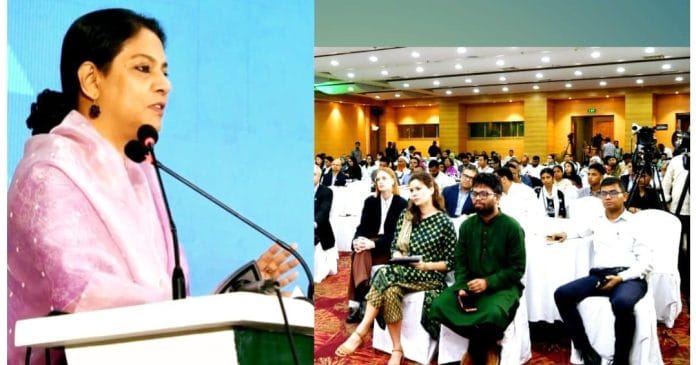Syeda Rizwana Hasan, Environment, Forest and Climate Change Adviser, emphasised that while “sustainability” is a widely used term, it often lacks a clear definition and measurable criteria—leading to risks of greenwashing rather than ensuring justice or equity.
“This concern is particularly pressing for Bangladesh as we prepare to graduate from the Least Developed Country (LDC) category. If this transition is to be meaningful, the standards we adopt must also evolve,” she stated.
Addressing the concept of a just transition, she highlighted the need to broaden the conversation beyond the energy sector. “Every sector—textiles, agriculture, manufacturing—must have clear guidelines and standards so the country advances collectively, rather than in isolated pockets.”
She made these remarks while delivering her address at a session titled “Bangladesh Just Transition Academy: Decent Work for All in a Green Economy”, organized by the International Labour Organization (ILO) at the Bangabandhu International Conference Center (BICC), Sher-e-Bangla Nagar, Dhaka, on Tuesday.
The Environment Adviser observed that while the journey toward sustainability has begun—particularly in the private sector, often driven by pressure from international buyers—it remains fragmented and lacks formal structure. “We have yet to collectively define what we agree upon, and more importantly, what we reject.”
Drawing from her experience in environmental advocacy, Rizwana Hasan criticized the reliance on superficial technological solutions. “When we challenged the burnt brick industry, the shift to zigzag kilns was promoted as a sustainable alternative. But these still polluted the air, stripped agricultural lands of topsoil, and caused hill-cutting. Raising chimney heights was presented as another solution, but these were mere patchwork fixes. Thirty-two countries have already phased out burnt bricks—Bangladesh must commit to a full transition to alternatives that protect our air, soil, and workforce.”
She also criticized the tendency to avoid confronting environmental issues head-on. “From labor exploitation to excessive water use, responses often come from the private sector but rarely reach scale. What we need is structural transformation.”
Calling on academic institutions to lead the way, she urged them to help shape national strategies across all sectors. She also pressed public agencies to embed environmental values into their core mandates. “People expect the Department of Environment to rubber-stamp every project. When we reject a proposal due to environmental concerns, we are seen as obstacles to development—as if development and environmental protection are mutually exclusive. This mindset must change.”
She stressed that all government bodies—including those overseeing local government, transport, and energy—must share a unified commitment to sustainability. “Green certification for buildings is meaningless if we ignore gender sensitivity, labor welfare, water recycling, and energy efficiency. Look around—it’s not even 10 a.m., yet this room is ablaze with artificial light. Had the building been properly designed, this wouldn’t be necessary.”
Reflecting on broader societal attitudes, Rizwana Hasan said: “We often pressure the government to avoid load-shedding, yet continue to waste imported energy. This is not merely a policy failure—it reflects a deeper failure to internalize sustainable values.”
She concluded by expressing hope that international organizations, along with the government, private sector, and civil society, would champion sustainable practices that extend beyond pilot projects and shape long-term national policy. “This is not about a single government—it is about creating institutional legacies for the future.”
She reaffirmed the full support of the Department of Environment, the Ministry of Environment, Forest and Climate Change, and the Ministry of Water Resources in driving a truly just and sustainable transition for Bangladesh.

